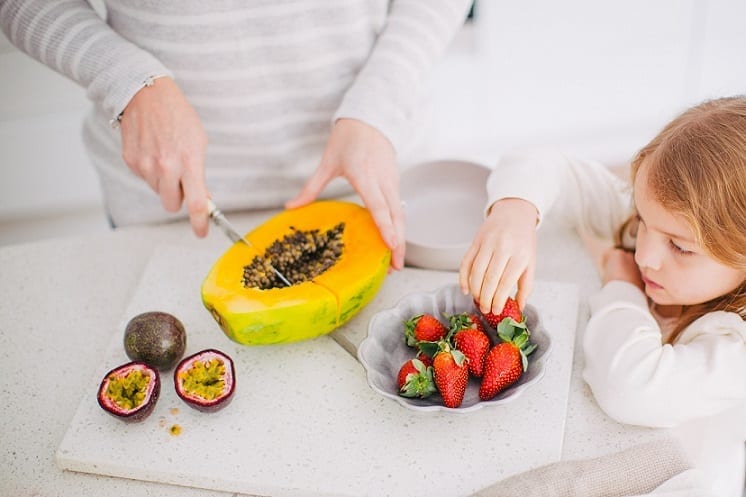I see a lot of children in my clinic whose parents are at their wits end. Kids will be kids, sure, and we should let them be kids for as long as possible. Where is the line between being a child and having behavioural issues?
Since the very first national survey on ADHD in 1997 there has been a very steady incline in parent-reported ADHD diagnoses. It would appear that ADHD and behavioural disorders are on the rise. As a naturopath, clinical nutritionist and medical herbalist I see a lot of fantastic results with children through diet and lifestyle modification and temporary nutritional and/or herbal supplementation.
ADHD – Compliments of packaged food
It’s hard to know what to feed kids nowadays – the companies who bring us all of these packaged foods and snacks are so convincing that their product is healthy and contributes to your child’s nutritional status.
What they don’t advertise is the cocktail of additives and preservatives, the huge wad of sugar and salt, the artificial sweeteners or the chemicals in that ‘food’ which is contributing (or causing) your child’s behavioural issues.
Packaged foods such as muesli bars, fruit straps, fruit juices, flavoured milks, chocolates, crackers and chips should all be considered “sometimes foods”.
Next time you go shopping for your child, take the table below with you. If the food item falls within the “good” column – great! If it is within the “okay” section, I generally allow this sometimes, depending on what it is.
If the product falls within the “bad” column, put it back on the shelf!

- How to create a good mood lunchbox
- Get your child on the right track: five tips for healthy snacking
Be Mindful
Many parents aren’t even aware that their child’s diet may need a bit of tweaking.
For one whole week, fill in a food diary for your child. Write down everything they put in their mouth including fluids and read back through it at the end of the week.
If you suspect your child may have behavioural issues, avoid:
- Muesli bars, fruit straps
- Most breakfast cereals
- Fruit juices, flavoured milks
- Chips, cookies, candy bars, chocolates, ice-cream (the obvious)
- Flavoured crackers (even the plain ones tend to have awful preservatives and additives)
- Take away and fast food
- White breads and pastas. Choose wholemeal (even try gluten free)
Your child’s diet should contain plenty of:
- Fresh fruit and vegetables
- Healthy fats such as fish, avocado, nuts and seeds (if they’re not allergic, of course)
- Water! (No cordial!)
- Lean proteins

The Fun Police
Now, I’m all for treating your child. I treat my daughter every so often – usually with homemade, healthier versions of her favourite treats and every now and then, I’ll get her something while we’re out.
We’re only human and we can’t expect to live a life without a little fun, right?
I do want to make a few points, however. Firstly, ensure the treats your child gets are usually homemade, healthier versions. Our taste buds are funny little things, the more crappy food and sugar we expose them to, the duller they become to flavours. When you lower your intake, of sugar especially, your taste for healthier foods comes back. In clinic I get a lot of parents tell me that their child’s behaviour is amazing when they follow my modifications and they at some stage fall back into old habits and they are amazed at the change once again in their behaviour.
The second point I want to make is frequency of ‘treats’. I treat my daughter once or twice a week, sometimes three times but I’ll always have healthy snacks on hand because snacking is good for you and important to health!
Healthy treats and snacks that you can make at home and have on hand are:
- Healthy versions of muesli bars
- Bliss balls
- Dark chocolate coated strawberries
- ‘Nice-cream’
- Good quality dark chocolate, like Loving Earth brand
- Smoothie pops
- Air popped popcorn
Other healthy snacks include fruit, veggie sticks, nuts and seeds, smoothies, and even a bit of good quality cheese (the less ingredients on the label, the better).

ADHD deficiencies
Many children with behavioural issues are lacking certain vitamins and minerals or can benefit from supplementation in nutrients such as zinc, omega 3 (especially DHA), CoQ10, magnesium, B vitamins, antioxidants and even digestive support supplements.
Many children benefit hugely by simple gut support, but that is another article in itself.
Ask your naturopath or nutritionist for help in these areas and never self-prescribe!
I’m not going to lie; this isn’t going to be an easy transition. Children have such an ability to crumble us with their behaviour. Not only in public but also within the walls of our own home! Remember, discipline never goes astray either but if a child’s diet and nutritional status is lacking, it’s hard for them too.
Start small, make little changes and reward them for their efforts – never reward with treats, but with behaviour charts, small gifts and trips to the park.
For more support, remember that you always have it in naturopaths, nutritionists, open-minded doctors and other health professionals.
Does your child have ADHD; have you tried to amend their diet? Please share your experiences in the comments below.





















9:19 pm
4:12 pm
7:34 am
8:09 am
11:44 pm
9:53 pm
9:32 pm
9:51 pm
7:49 pm
10:09 pm
2:59 pm
9:05 am
-

-
-
mom94125 replied
- 17 Oct 2015 , 6:28 pm
Reply3:08 pm
11:49 pm
3:54 pm
-

-
-
Kellie Holland replied
- 14 Aug 2015 , 8:24 pm
Reply2:14 pm
-

-
-
Kellie Holland replied
- 14 Aug 2015 , 8:24 pm
Reply12:20 pm
-

-
-
Kellie Holland replied
- 14 Aug 2015 , 8:25 pm
Reply10:10 am
-

-
-
Kellie Holland replied
- 14 Aug 2015 , 10:35 am
Reply5:44 am
-

-
-
Kellie Holland replied
- 14 Aug 2015 , 10:36 am
Reply- 1
- 2
- »
Post a commentTo post a review/comment please join us or login so we can allocate your points.